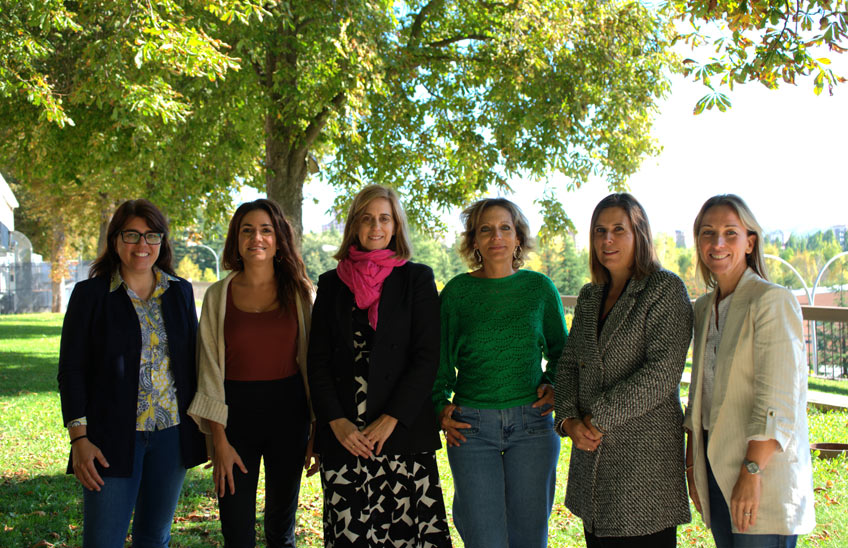association Antox, the University and Lares Navarra promote the project MAGNA to investigate addictions in elderly people in Navarra.
Alcohol, tobacco, opioid analgesics and hypnosedatives -the latter especially in women- are the most commonly used substances in people over 64 years of age.

05 | 11 | 2024
The association ANTOX, in partnership with the University of Navarra and Lares Navarra, leads the project MAGNA (Mayores Adicciones Género Navarra), whose goal is to investigate addictions in elderly people in Navarra and address their needs, with special emphasis on the gender perspective. The proposal will be carried out thanks to the partnership of the Innova Program, promoted by Fundación Caja Navarra and Fundación la "Caixa".
In Spain, alcohol, tobacco, hypnosedatives and opioid analgesics are, in this order, the most consumed substances according to the "survey on alcohol, drugs and other addictions in people over 64 years of age in Spain (ESDAM)" of 2019-2020 carried out by the National Plan on Drugs. Loneliness, old habits, lack of motivation, depression, drug abuse or lack of knowledge about their correct use, make the elderly an easy target for addictions.
The project MAGNA is based on the programs of study "Elderly people and addictions: a diagnosis of the University of Navarra and LARES with a gender perspective" and the"White Paper on Addictions in the Elderly", both of which reveal the social exclusion and double stigma suffered by these people due to their age and their addictions, with a particular approach in the status of elderly women.
The key objectives are the research and analysis, the training of professionals and students and social awareness. The project contemplates the realization of qualitative and quantitativeprograms of study through focus groups and surveys in social and health centers of Lares Navarra, to know in depth the reality of older people with addictions in the territory.
Patients, family members and professionals from the centers will participate in this process and specific training will be offered to students of Medicine, Nursing and Pharmacy at the University of Navarra, as well as to professionals from Lares Navarra, to provide them with tools that will enable them to address this problem more effectively. goal Likewise, with the aim of breaking stereotypes and promote a greater empathy towards this group, an awareness campaign will be launched aimed at Navarre society and professionals in the social and healthcare field.
Innovation, approach collaborative and gender perspective
"MAGNA not only aims to address a current issue, but also to anticipate future needs, given the increasing aging of the population. In addition, the project stands out for its innovative approach , which combines the efforts of sectors core topic such as geriatrics, addictions and academia," explains Elisa Arbizu Labarta, a professional at Antox and spokesperson for project. "The joint work between ANTOX, Lares Navarra and the University of Navarra is fundamental to offer a comprehensive response to this challenge. Our goal is to create a real change in the way addictions are perceived and treated in older people," she stresses.
In addition, Idoia Pardavila, professor at School of Nursing at the University of Navarra, stresses that the participation of students in project MAGNA "allows them to become aware of the social reality and respond to a current demand, instructions of service-learning". According to him, this approach not only contributes to their academic training , but also promotes in them a sensitivity towards the social impact of their future profession. "In the specific case of the students of the healthcare area , this acquired experience will act as a catalyst, allowing them not only to positively influence the care of their patients, but also to inspire their own peers and promote healthy public health policies. Thus, it becomes a tool of social change, strengthening the professional and civic engagement of future healthcare workers."
The National Strategy on Addictions 2017-2024 of the Ministry of Health dedicates a specific section to the gender perspective, in which it highlights the problem that unites women with hypnosedatives. It speaks of a "hidden consumption" and points out as aggravating the fact that "there are no widespread prevention and awareness campaigns, as is the case with other substances." The project MAGNA is aware of this reality, in addition to the triple discrimination faced by older women, who are made invisible: because of their age, their gender and their addictions. That is why all activities and trainings will be designed taking into account the specific needs of this group, ensuring that care is inclusive and comprehensive.

